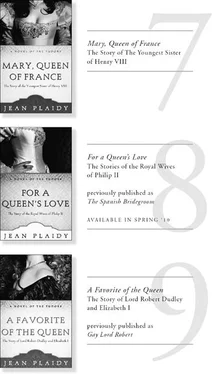Jean Plaidy - The Murder in the Tower - The Story of Frances, Countess of Essex
Здесь есть возможность читать онлайн «Jean Plaidy - The Murder in the Tower - The Story of Frances, Countess of Essex» весь текст электронной книги совершенно бесплатно (целиком полную версию без сокращений). В некоторых случаях можно слушать аудио, скачать через торрент в формате fb2 и присутствует краткое содержание. Жанр: Старинная литература, на русском языке. Описание произведения, (предисловие) а так же отзывы посетителей доступны на портале библиотеки ЛибКат.
- Название:The Murder in the Tower: The Story of Frances, Countess of Essex
- Автор:
- Жанр:
- Год:неизвестен
- ISBN:нет данных
- Рейтинг книги:3 / 5. Голосов: 1
-
Избранное:Добавить в избранное
- Отзывы:
-
Ваша оценка:
- 60
- 1
- 2
- 3
- 4
- 5
The Murder in the Tower: The Story of Frances, Countess of Essex: краткое содержание, описание и аннотация
Предлагаем к чтению аннотацию, описание, краткое содержание или предисловие (зависит от того, что написал сам автор книги «The Murder in the Tower: The Story of Frances, Countess of Essex»). Если вы не нашли необходимую информацию о книге — напишите в комментариях, мы постараемся отыскать её.
The Murder in the Tower: The Story of Frances, Countess of Essex — читать онлайн бесплатно полную книгу (весь текст) целиком
Ниже представлен текст книги, разбитый по страницам. Система сохранения места последней прочитанной страницы, позволяет с удобством читать онлайн бесплатно книгу «The Murder in the Tower: The Story of Frances, Countess of Essex», без необходимости каждый раз заново искать на чём Вы остановились. Поставьте закладку, и сможете в любой момент перейти на страницу, на которой закончили чтение.
Интервал:
Закладка:
“Frances,” said her father, “your great-uncle has come from Court to bring you good news.”
Frances turned hopefully toward Northampton. There was nothing shy in her manner, a fact which half pleased, half annoyed Northampton.
“Come here, child,” he said.
She stood before him waiting while he peered into that oval face seeking some imperfection. He found none.
“How would you like to go to Court?”
“More than anything in the world,” she answered fervently, and her eyes sparkled.
“And what do you think they would want with a child like you at Court?”
“I do not know, Great-Uncle, but I am waiting to hear.”
Was she pert? He was not sure.
“Whether or not Frances Howard was at Court would give little concern, I’ll warrant.”
“Yet Frances Howard is to go to Court, Great-Uncle.”
“Your are fortunate to have a father, mother and great-uncle who have your welfare at heart.”
“Yes, Great-Uncle.”
“The fact is—we have a husband for you.”
“A husband … for me! Oh, where is he?”
“Do you think I carry husbands around in my pocket, child?”
“I have heard it said that the Earl of Northampton is capable of anything, sir.”
Yes, she was pert; but sharp of wit. What did she need—a place at Court, money lavished on her, or a whipping? He would discover, and whatever she deserved she should have.
Northampton saw that Lady Suffolk was trying not to smile. She should be careful. Her reputation was none too good. It was said that she took advantage of her husband’s Court posts and accepted bribes for certain services. The woman’s morals were not too sound either; and she spent a fortune on her clothes and jewels.
Northampton decided to ignore the girl’s comments, telling himself that perhaps he was inviting them.
“You are to have a wedding, child, at Court. The King himself is interested in your bridegroom and wishes to see an alliance between his House and ours.”
“May I know his name, sir?”
“Robert Devereux, Earl of Essex.”
“An Earl. How old is he?”
“Your own age, child … or as near as makes no difference. Your mother tells me you are twelve. Robert is fourteen.”
“Fourteen and an Earl already!”
“His father has been dead some years.”
“His father lost his head, I believe,” said Frances. “I have heard of the Earl of Essex.”
“It is an accident which happens now and then in the best of families,” murmured Northampton.
“The better the family, the more frequently,” put in Lady Suffolk. “A fact, daughter, which we must all bear in mind.”
“I shall remember,” said Frances.
“I trust you will be grateful to your family for arranging such a good marriage for you,” went on Northampton.
“Is it such a good match?” the girl asked.
“Do you doubt it, Frances?” cried her mother.
“Well, Mother, I have always been taught that there is only one family good enough to mate with the Howards: the royal family.”
Northampton smiled grimly at her parents. “This girl is but twelve, you say?”
“I remember well enough the day she was born,” said Lady Suffolk. “Although I must say that bearing children had become rather a habit with me since I married Suffolk. Seven boys and three girls—not a bad tally, Uncle?”
“The Howards could always fill their cradles. They were not like the Tudors—a barren lot. But this child has a ready answer.” He turned to Frances. “You have a tongue, girl.”
“Why, yes.” She immediately put it out and the expression on her face implied that she enjoyed the gesture.
“Guard it well,” he told her. “I sense a certain waywardness in it. When you go to Court you must not speak with the freedom you employ here in the country.”
“I understand, Great-Uncle.”
“Now, you must prepare yourself for your wedding.”
“Yes, Frances,” her mother put in, “we shall have to start at once on your trousseau. You must be worthy of the Earl of Essex.”
“Fine cloths! Jewels!” cried Frances, clasping her hands together. “How I love them!”
Northampton thought the parents should have had more control over the girl. He now desired her to leave them. He had seen her, assured himself that they had a little beauty who would be ripe for marriage in a year or so; and that was good enough.
He waved his hand and her father said: “You may leave us now, Frances.”
“Yes, Father,” said the girl; but she hesitated.
“Well?” said Northampton.
“When shall I leave for Court?”
“As soon as your wardrobe is ready,” answered her mother.
“We shall lose no time. The King himself is eager to see you married.”
“I wonder why—” began Frances.
But Northampton interrupted impatiently. “It is not for you to wonder, girl, but to obey your parents. I believe I heard your father tell you you might leave us now.”
Frances demurely lowered her eyes, swept another curtsy and blithely left her elders.

In her own chamber, Frances called together three of her favorite maids. They were well-bred girls who were more like friends than servants, and their parents were delighted for them to be brought up in the household of the Earl of Suffolk, who was a man of influence at Court and held among other offices, that of Lord Chamberlain of the King’s Household. These three were not more than a year or so older than Frances; but by reason of her rank and personality she completely dominated them.
“Listen,” she demanded. “It is true—what we suspected. My parents are here because I am to be married. My great-uncle himself deemed it necessary to tell me.”
Then she recounted in detail the interview which had just taken place, coloring it a little to make herself a trifle more audacious than she had been, taking the part of the Earl of Northampton and Frances Howard alternately.
“Mistress Frances!” cried one of the girls. “You’ll be the death of me. And did you, in truth, put your tongue out at my lord?”
“I did. He asked for it. I fancy he wished he hadn’t provoked me. I wished that someone very important … someone like the King or the Prince could have come in and seen me standing there putting my tongue out at the Earl of Northampton.”
“The King would have thought it a great joke, I am sure. He would have given you a high place at Court and made you one of his favorites.”
“I should have to dress in breeches and cut off my hair first,” said Frances, catching at her long curls and holding them lovingly. “The King has no eyes for girls. You should know that.”
“Has he not then, Mistress Frances?”
“Do you know anything?”
“We dare not listen at doors as you do, Mistress,” put in another girl quietly.
Frances swung round and slapped the girl across the face.
“If I wish to listen at doors, Miss, I will. And think again before you speak thus to me. I can have you whipped; and don’t forget it. I might even do it myself … to make sure the blood is drawn.”
Her eyes were suddenly dark with anger. The girls drew back. She meant what she said. She could be friendly at one moment; she could be generous; but if she were offended, vindictive.
The girl was quiet, her eyes downcast as gradually a red mark appeared where she had been struck.
Frances turned her back on her and went on: “I can scarce wait to go to Court. I’m tired of being a child in the country.”
“Marriage is but the first step, Mistress. And when you go to Court all the men will—”
Читать дальшеИнтервал:
Закладка:
Похожие книги на «The Murder in the Tower: The Story of Frances, Countess of Essex»
Представляем Вашему вниманию похожие книги на «The Murder in the Tower: The Story of Frances, Countess of Essex» списком для выбора. Мы отобрали схожую по названию и смыслу литературу в надежде предоставить читателям больше вариантов отыскать новые, интересные, ещё непрочитанные произведения.
Обсуждение, отзывы о книге «The Murder in the Tower: The Story of Frances, Countess of Essex» и просто собственные мнения читателей. Оставьте ваши комментарии, напишите, что Вы думаете о произведении, его смысле или главных героях. Укажите что конкретно понравилось, а что нет, и почему Вы так считаете.











